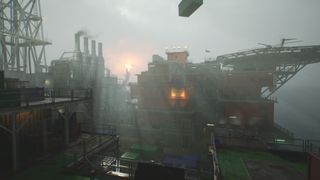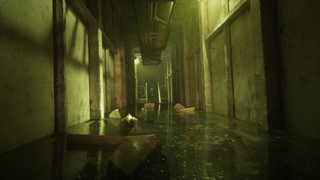“The player should feel like they are almost always about to die but never do.” This is what the lead developer, Rob McLachlan, told me after I’d finished playing through the first third of the upcoming single-player horror game Still Wakes the Deep. Almost a week later, I’m still thinking about how brilliantly accurate that statement is.
Working on an oil rig off the coast of Scotland seems unnerving enough, the developers even told me that they couldn’t get access to a rig due to the strict training that’s needed, which includes being dunked into the North Sea to prove that you could survive a fall into the frosty ocean. But The Chinese Room doesn’t use this fantastic setting as just some horror gimmick. Instead, it’s clear the devs have worked hard to springboard off this isolated location, using it to terrorise players in some really creative ways.

An oil rig is made up of various compartments and sections for ease of access and navigation, but humans come second on these metal islands. With the machinery being prioritised it takes up most of the space everywhere except for the few social rooms like the lounge and kitchen. This is one of the reasons why navigating the Beira D is so difficult and daunting—most of the locations aren’t made with you in mind: “We made a lot of spaces that are very small, so you feel like you’re squeezing your body through because it’s a place for machines, with humans moving through gaps between them,” McLachlan says. “We wanted players to feel that physical connection with the rig.”
After a mysterious horror wreaks havoc, the protagonist Caz decides to search for his old friend Roy, but to get to the kitchen where he’s waiting, you first need to make your way through the underbelly of the rig. This is where you first have to traverse the engine room. I knew it was a bad idea to navigate the pitch-black corridors as some mysterious monster howled in the distance, but with no way else to get up to the kitchen, I wasn’t left with much choice.
Needless to say, what followed was a small slice of my own version of hell. Racing through the various cooling vats, wiggling through pipes, and finally having to crawl underwater through some small gaps in the machinery, all while something chased me down, screaming at me as it got closer, was traumatising, to say the least. At one point, I even got an option to instantly look behind me so I could get a better look at the horror that was chasing me, but I quickly declined—looking back is for losers who can’t run fast enough. Also, I was too scared.
Chase sequences and stealth missions are pretty commonplace while you’re exploring inside the rig as the environment warps. These do handle well, as navigating the small spaces is easy thanks to the straightforward controls and well-signposted prompts. However, if the entire game was composed of these moments, it would be difficult to see it through as it’s non-stop adrenaline fuel, but luckily, the devs balance it out as they make use of the rig’s exterior as well. “There’s a lovely contrast there because you’re in a tiny area, and then suddenly it opens out, and it’s a great drop to the sea,” McLachlan says.

Outside, you’ll find a different kind of terror waiting for you. The devs made it pretty clear that one of the pillars of Still Wakes the Deep is facing your own fears. While the inside is full of claustrophobic moments, the outside is nightmare fuel for anyone scared of heights, including myself.
Walking over the rickety iron walkways is unnerving without the added bonus of some cosmic horror pulling the rig apart, so now you get to shakily crawl across planks with the structural integrity of a toothpick and jump over massive gaps that no human in their right mind should ever attempt to do. But there are only a few ways to navigate the Beira D and this is one of them, so you have to face it head-on, even if it does make you feel slightly queasy.
Still Wakes the Deep ensures that every bit of action and dialogue is concise.
There are also quick-time events, which basically just account for you grabbing onto ladders and rebalancing yourself if you take a tumble off the side of the rig, but these are pretty straightforward and littered around, so it doesn’t feel like an action sequence out of Until Dawn.
But that’s just one example of how Still Wakes the Deep ensures that every bit of action and dialogue is concise. With the devs saying that it will probably clock in at six to eight hours long, which I think is the right kind of length for a horror game. It means that everything on the Beira D feels like it’s meant to be there and not just taking up space. So far I haven’t encountered a dialogue that felt unnecessary or too long, and action sequences didn’t make me suffer for no reason.
Loving a horror game can be hard work, it’s unforgiving at the best of times and downright terrifying at the worst. But every so often, there’s one that manages to get the balance of beautiful, intriguing, and horrifying just right, giving you just enough incentive to venture on through the rubble, unnerving chase scenes, and blood-curdling screams and Still Wakes the Deep is exactly that. There were a couple of moments as I hid under rubble or in lockers when I asked myself if this was really worth heart palpitations, but with a setting that’s equal parts fun and terrifying to explore, Still Wakes the Deep is definitely worth all the figurative blood sweat and tears I have and will spill over it.


